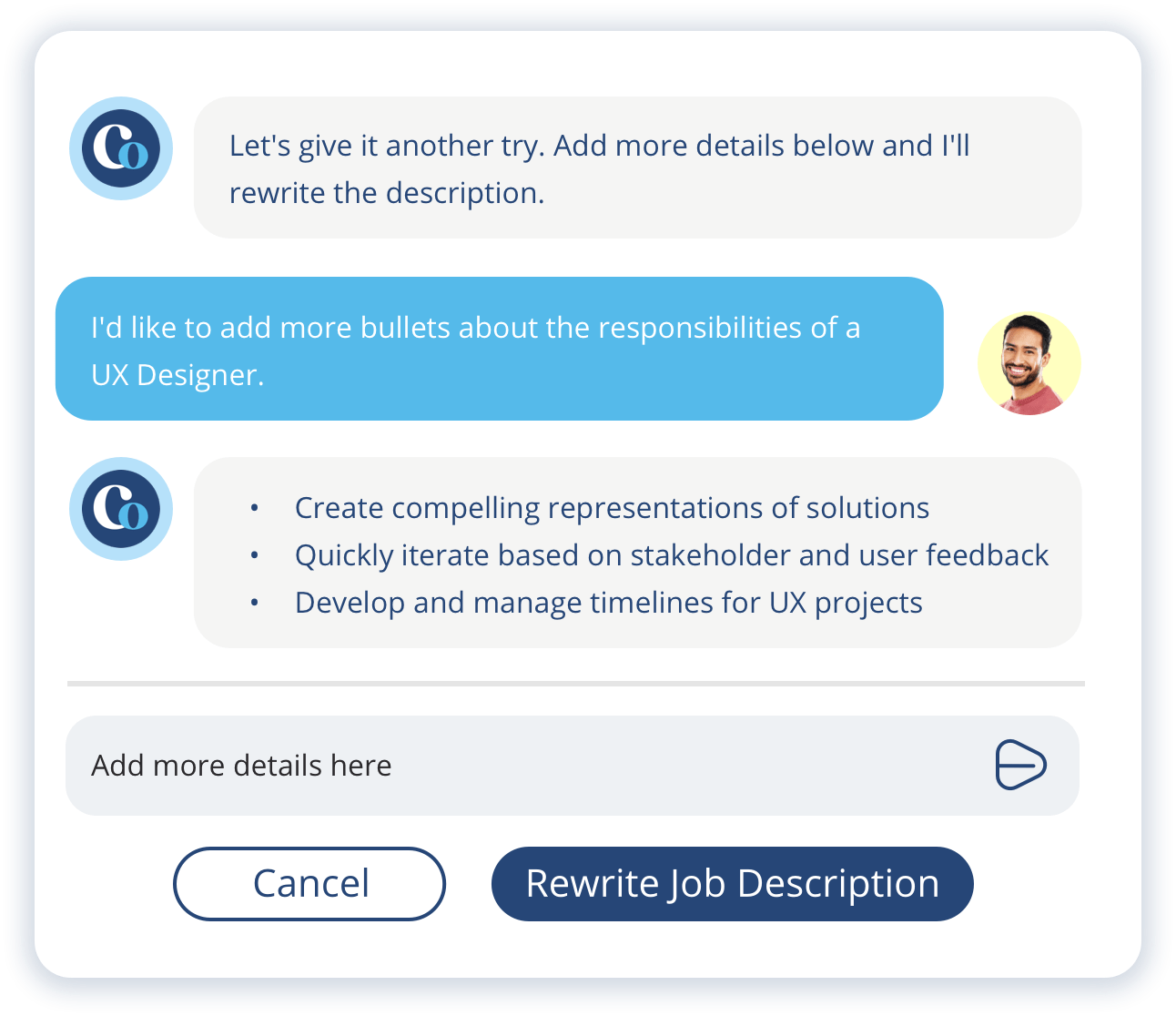
Artificial intelligence (AI) has arrived in the human resources industry — and seemingly everywhere else — all at once. AI simulates human intelligence by taking in and analyzing data to solve problems with the help of machine learning (ML) and natural language processing (NLP). AI can instantly analyze truly superhuman amounts of data, which is why it’s such a powerful tool. It learns from experience, recognizes patterns, and can even make decisions.
Strategic HR teams are leveraging AI to make their workdays easier, take repetitive tasks off their hands, and draw conclusions from all that data. Do the same, and you’ll have more time to focus on developing your HR strategies and access to all the insights you need to perfect them.
At the crossroads of AI and HR is an innovation and transformative potential. By blending AI’s capabilities with HR processes, you gain the power to streamline operations, enhance employee experiences, and propel your workforce to new heights of success.


AI has already had a transformative impact on how HR professionals manage and optimize their workflows. It can be used to improve HR processes in many ways:
Artificial intelligence in HR is groundbreaking because of its ability to analyze incredible amounts of data, make decisions informed by that data, and streamline repetitive tasks. That results in a remarkable boost to the efficiency, accuracy, and overall effectiveness of HR operations.
Explore AI SolutionsYou might hear the terms generative AI or predictive AI. Generative AI mimics human creativity, producing brand-new content from data — for example, writing a new job description based on the role competencies or performance feedback based on employee reviews, manager notes, and recognition.
Predictive AI clues you into what could happen in the future based on historical data. For example, predictive AI can analyze employees’ past performance in a particular role to identify the traits you should look for in candidates.
Both types of AI are useful for building personalization into the employee experience, preparing for the future, and making better decisions. There are applications for both types of AI in HR, and AI-enhanced software typically combines the two.
Make sure you have a plan of action when using AI tools with your current HR technology or purchasing new technology fitted with AI. Start with understanding AI in HR tech to increase the chances that you’ll choose the best AI system for your company and reap its benefits.
Here are the best practices for integrating AI into your HR technology and processes:

Due to the potential risks of AI technology, including data privacy and potential bias, it’s of the utmost importance to ensure your company and your AI provider are aware of those risks and have procedures in place to mitigate them.
At ClearCompany, we are committed to developing our AI features ethically and responsibly. We created our 5 Pillars of Responsible AI to guide our product development and demonstrate our commitment to using this technology with integrity and enabling our clients to do the same.
We abide by all applicable regulations and ensure our customers can as well.
We safeguard our AI models with robust measures against unauthorized access and influence.
We employ data science best practices to provide customer insights while securing differential privacy for their stakeholders.
We actively enable diversity, equity, inclusion, and belonging (DEIB) through the thoughtful design, testing, and monitoring of our AI tools.
We create AI systems to augment human capabilities — to assist, not replace, the HR professional in making talent decisions.
Get Your Free Demo
Candidate recruitment and selection — or talent acquisition, or recruiting and hiring — is a high-touch role; recruiters must stay in touch with candidates and potential future candidates to succeed. If they don’t hear from your company within two weeks of the first interview, 62% of employees say they’d lose interest.
AI-driven talent acquisition makes it easy for even the busiest recruiters to stay in touch — and that’s not all. Responsibly developed AI helps increase fairness and accelerates the entire recruiting and hiring process.
Transform talent acquisition with the magic of AI:
Onboarding is an essential HR function that impacts the entire employee journey. When they focus on employee onboarding, companies see retention increase by up to 50%. Onboarding can also improve employee engagement by up to 54%.
AI in HR helps organizations create structured onboarding programs tailored to the employee.
Here’s how:
Performance management necessitates a lot of involvement from HR and management. HR has to:
AI HR software can manage it all, generating review cycle schedules, suggesting review templates or questions, and automatically sending notifications when reviews are due.
Managers’ duties include:
AI in HR tech helps managers write feedback by analyzing all the data housed in the system about that employee and generating feedback, praise, and constructive criticism. AI considers everything from self-evaluations and manager notes from 1:1 meetings to peer reviews and recognition. AI can also suggest whether employees might be good candidates for promotions, better suited to a different role, or need improvement.
Retaining employees is a top priority for any organization, especially in competitive labor markets. AI helps predict employee turnover and identify what’s causing it. With this information, HR teams can develop proactive retention strategies, and succession plans to retain top talent and groom future leaders.
AI can help your HR team make decisions about employee learning and development initiatives and personalize the experience for your team members. AI-based programs can guide employees based on their needs and learning styles and even generate assessment questions to evaluate them. They can also assist with compliance, ensuring employees complete job-, industry-, or area-specific mandatory training, like sexual harassment or anti-discrimination courses.
Using AI to make your HR processes faster and more personalized can greatly impact employee engagement. AI automates tasks and analyzes data, freeing up your HR team’s time and empowering them with deeper people insights. The result? An HR team that understands the best ways to engage its workforce.
AI can act as an engagement-boosting tool by prompting managers and employees to give feedback and recognition at the right time, like when an employee completes one of their goals or hits a milestone. It increases transparency around each person’s contributions and encourages employees to make connections, positively affecting engagement levels.
AI also helps HR teams monitor employee sentiment and well-being with data from surveys, performance reviews, and recognition tools. Its findings allow you to proactively address concerns, improve workplace satisfaction, and foster a positive work environment.
People analytics and artificial intelligence is an unbeatable combination. The wealth of knowledge from your people data paired with the power of AI adds up to an incredible depth of insight you can’t get any other way. Analytics and reporting tools present your people data in a consumable way, turning it into graphs and tables that you can read and use to make decisions.
AI takes people analytics to the next level, offering valuable insights into employee trends, performance, and workforce demographics. HR teams can use this data to make decisions, anticipate staffing needs, and optimize people strategies.
In recent years, the renewed focus on talent management created an increasing need for HR teams to get more done and work more strategically. But that doesn’t always come with a budget increase or new HR employees to manage that work.
Fortunately, AI is here to help optimize HR processes and provide insight for a data-informed strategy. If you apply it ethically and responsibly, artificial intelligence can positively impact HR processes.
Explore AI Solutions
AI-powered software helps busy HR and recruiting teams speed up slow workflows, freeing up valuable hours they can instead spend on more involved work, like developing employee engagement initiatives or sourcing candidates for hard-to-fill roles.
Bias in the recruiting process causes companies to miss out on excellent candidates and, ultimately, hurts their success. AI objectively analyzes resumes and candidate profiles, avoiding any unconscious biases human candidate sourcers might have. It can also help reveal patterns resulting from bias, like a tendency to hire white candidates over BIPOC candidates, so that you can investigate and address those patterns.
Employees today want to work for a company that treats them like the important assets they are. Boost employee experience at every stage with AI-powered processes — get them hired faster, tailor onboarding programs to their needs, review performance thoroughly and fairly, keep them engaged, and help them grow.
AI in HR technology is a new frontier we’re rapidly mapping — and as we continue to explore it, the possibilities multiply. Here’s where you should expect to see AI applied in the very near future:
We’re already using AI to find candidates that match our job descriptions. AI will continue to refine its ability to recommend the right candidate for the job, enabling predictive hiring. With predictive hiring, AI tells us which candidates are most likely to stay in the role the longest and be most successful. That helps your HR team make smarter hiring decisions, saving tons of time and money on replacing bad hires.
Employee well-being is critical — it’s high on job seekers’ priority lists and plays a big part in shaping healthy company culture. AI-powered tools can assist HR with answering questions about benefits and personalize wellness for your workforce.
Here are some of the ways AI HR software takes employee well-being up a notch:
Setting up new software is no walk in the park — but AI is changing that. AI-assisted software implementation can help companies get their new HR tech up and running faster. It cuts down on calls to the software vendor, enabling faster resolutions to common problems and quicker adoption of the new platform.
The potential for AI in HR tech becomes truly exponential when you apply it to workforce planning and analytics. AI will enable HR teams to delve into workforce planning with exceptional accuracy and efficiency. With AI, you can simulate various staffing scenarios to determine your company’s effective headcount — the ideal number of new and fully ramped employees required to maintain productivity, taking attrition and workforce growth into account.
AI-driven workforce analytics takes data processing to a new level, helping HR teams extract valuable insights from massive datasets to identify patterns, anticipate skill gaps, and even predict which employees are at risk of quitting. This knowledge enables HR departments to develop proactive talent acquisition and retention strategies that ensure they hire the right talent at the right time.
AI assists with strategic decision-making by offering predictive analytics that allows HR to anticipate workforce trends and make informed choices aligned with company goals. AI-powered tools can analyze employee performance data, identify high-potential talent, and suggest comprehensive succession plans.
AI’s impact on workforce planning and analytics can even support HR teams in promoting workforce diversity and inclusion. AI can analyze demographic data and talent metrics to uncover disparities or potential biases. That points your HR team in the right direction with targeted diversity initiatives that foster an inclusive workplace culture.
Integrating AI in workforce planning and analytics empowers HR leaders to transform their operations from reactive to proactive and strategic. With its data-informed insights, you can optimize talent acquisition, retention, and development strategies to foster an agile, adaptable workforce ready to drive growth and success in an ever-changing business landscape.
Artificial intelligence (AI) in HR refers to the practice of using AI technologies to automate and enhance HR tasks and processes and support decision-making. AI can be applied to every function of talent management, with uses in talent acquisition, onboarding, employee engagement, recognition, performance management, retention, and workforce analytics.
AI technology like natural language processing (NLP) and machine learning (ML) can perform tasks independently that would typically require human intelligence to complete. It also completes those tasks much faster than humans can, enhancing HR efficiency.
HR should be aware that using AI does come with some challenges:
AI in HR tools include:
There are many benefits of implementing AI in HR processes:
No, AI is unlikely to replace the humans in human resources, but it will augment many of their roles. AI is helping HR become more efficient, eliminating manual tasks and giving them access to data-powered insights. But people are still crucial for situations that require human judgment, empathy, and strategic thinking, including employee relations, leadership development, managing company culture, and more.
AI allows HR professionals to have a bigger impact on business strategy by giving them the time to focus on more complex work and the insight to make better decisions.
AI’s influence is spreading quickly, and it’s clearly poised to reshape the HR industry. The future of HR lies in embracing AI’s potential to elevate talent management and unleashing a new era of human capital management and organizational excellence.
Harness the power of AI responsibly for effective, efficient talent management and a loyal, engaged, creative workforce.
Explore AI for HR